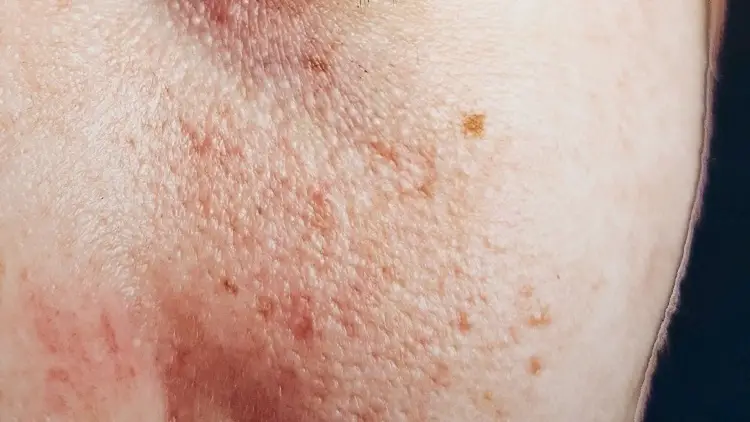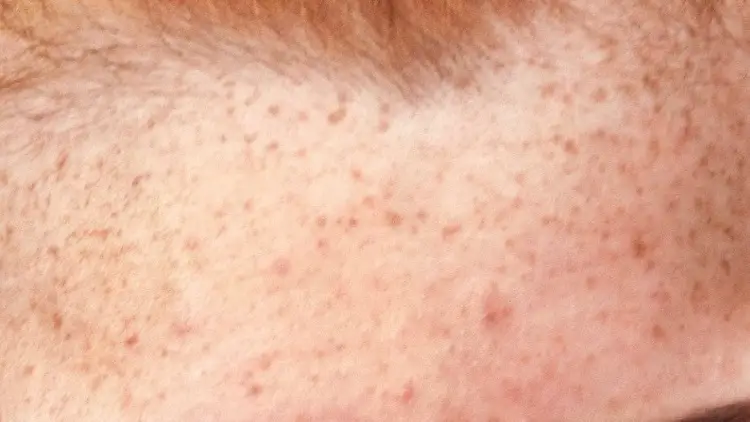Suddenly, your little one’s face is covered with acne. This can make any new parents worried and at the same time uncomfortable, but be rest assured that acne is fairly common in babies.
This condition appears within the first few months of a newborn’s life. It is sometimes believed that newborn baby acne develops because of hormones passed from the mother to baby during pregnancy.
In this article, we will tell you all you need to know about baby acne, what causes it, and tips on what to use for baby acne. Read on for effective baby acne home and natural remedies.
What Is Baby Acne?
People usually tend to associate acne with puberty and a person’s teenage years, but it is relatively common for a baby to get acne.
Baby acne or neonatal acne is a term used to describe an acne-like breakout on your baby. It is usually a temporary skin condition, which causes red or whitish bumps on the face and body.
Types Of Baby Acne

According to Lana Gagin, MD, a pediatrician with Spectrum Health there are two types of baby acne: neonatal or “newborn” acne and infantile acne.
Neonatal acne (neonatal cephalic pustulosis) is generally referred to when an infant has baby acne while infantile acne occurs later in life and this acne is a true form of acne found in young children.
Difference Between Neonatal Acne And Infantile Acne?
Neonatal Acne Symptoms
- Acne appears at about two or three weeks of age
- Lasts for a few weeks to a few months
- Affect about 20 percent of children
- Looks like red, inflamed bumps and pimples and may be found on the cheeks, forehead, chest, and back
- May not cause scarring
Infantile Acne Symptoms
- Appears at about three months
- Acne lasts for a few months or up until ages two or three
- Usually affects less than two percent of children
- Looks like teenage acne, with pimples, blocked pores, and blackheads
- May cause scarring
What Causes Baby Acne?
Yes we know baby acne is one of the most common skin conditions that develop in newborns and infants, but as a concerned parent seeing these little bumps flare-up in their faces can be stressful. Below are various theories that could cause baby acne.
Maternal Hormones
This baby acne can be due to maternal hormones that are still circulating in your baby system after birth.
These maternal hormones stimulate newborn sluggish oil-producing glands, causing pimples to pop up on the chin, forehead, eyelids, and cheeks, and, sometimes, the head, neck, back, and upper chest.
Formula Reaction
Feeding your baby sometimes can be unpredictable and can get messy as well. The active ingredient in the formula you use could be the root of your baby’s acne.
Especially, when formula this comes into contact with your little one’s skin.
Having known that baby’s skin is sensitive; always pay attention to whether the formula makes contact with your baby’s skin, especially if they are prone to spitting up.
Yeast
Another theory is that certain strains of yeast living on your little one’s skin cause baby acne. As yeast colonizes on the surface of a baby’s skin, their skin becomes inflamed and baby acne forms.
Furthermore, some doctors believe that a lipophilic yeast known as the Malassezia species may be responsible.
Probiotic Imbalance
Probiotics are helpful bacteria (Lactobacillus) that humans need in our stomachs to properly digest food. As a newborn, your baby is still trying to acquire the right bacteria to maintain a healthy balance in her tummy.
This can result in a probiotic imbalance. Some medical professionals believe that an imbalance of probiotics is the true cause of baby acne.
Medication Reaction
Sometimes certain medications and viral illnesses also have the potential of causing an acne-like rash on your baby’s skin.
Do not forget to contact your doctor, if your little one develops a rash or acne-like breakout after being sick or being exposed to a new medication.
When Does It Start And End?
Baby acne or neonatal acne usually begins at 2 to 4 weeks and can last for several months, often clearing up between 4 and 6 months, though it varies.
This rash usually starts around 2 to 3 weeks of age on the face and cheeks and can continue until around 6 months of age.
And just in case you’re already worrying about your little one being teased in middle school, know that baby acne doesn’t leave permanent scars as the grown-up version can, and it doesn’t predict future teen acne problems.
Read Also: How To Wash Newborn Face
What To Use For Baby Acne?
Newborn skins are very sensitive and should be properly cared for in the right way. As tempting that pimple may look, never try to pop or squeeze it. Below are a few baby acne treatment tips you should try.
Home Remedy
These tips are to help and care for your baby’s skin while he or she has acne:
- Keep your baby’s face clean and always wash your baby’s face daily with warm water and mild baby soap.
- Dry your baby’s face gently.
- Don’t pinch or scrub the acne. You may cause more irritation or infection.
- Avoid using lotions or oils on your baby’s face.
- Wash your baby’s skin with lukewarm (not hot) water.
Natural Remedy
Extra virgin coconut oil
Coconut oil is completely natural and perfect for those red bumps. Hence, it soothes and moisturizes your baby’s skin. Simply apply a few drops to the affected areas four times a day until the acne clears up.
Cornstarch
This is one of the best baby acne remedies, simply because you can find it in your kitchen and every grocery store around you. Just mix it with water and apply it to the affected areas to notice a difference. It dries the skin naturally and cures acne like a charm.
Breast Milk
Breast milk has some antimicrobial properties that can help keep your baby healthy. Some mothers Consider it baby’s first.
Honey And Lemon
These two naturally cleanse and nourish the skin. They can also work on delicate skin. Mix honey and lemon in equal proportions and apply it to the affected area for healing acne naturally. Leave it for about 25 minutes and rinse with warm water to complete the treatment.
Diet
Eat right, if you’re a nursing mother and want to cure baby acne, change your diet. Stop eating sweet or sour foods, and always cut down on dairy products. Avoid oily foods and citrus fruits as well.
Use Mild Detergent
Wash your baby’s clothes with chemical-free detergents. That’s because some of these harsh detergents may stick to clothing and worsen the acne.
Sandalwood Paste
Sandalwood paste also helps to treat tiny acne spots on the skin. Just mix one part sandalwood paste with two parts of mustard oil, and apply on the acne-affected areas. Sandalwood is also known for its cooling and anti-inflammatory properties.
Talcum Powder
Sprinkle a little bit of talcum powder onto the palm of your hand, and rub it gently on your baby’s acne-affected face.
Use your fingertips for the best results. Remember to double check the label to confirm whether the drying ingredient in the powder is talc or cornstarch.
Other skin conditions in newborn babies include
Infant eczema
Diaper rash
Cradle cap
Baby heat rash
Milia (milium cyst)
Read Also: How To Improve Baby Skin Color Naturally
Interesting Facts Between Baby Acne And Eczema?
Babies are relatively prone to rashes and other skin problems. These two skin conditions that are common in babies.
These two conditions can be tricky to differentiate because they both cause rash-like patches on the skin. These facts below will help guide you in knowing the differences.
Appearance
Baby acne will present as white pimples or red spots. Infantile acne tends to include blackheads and whiteheads as well as pimples and spots, and it may also cause cysts.
While babies under the age of 6 months eczema will usually appear red and weepy. If it becomes infected, the skin can develop small lumps that contain pus.
Age
Neonatal acne usually develops in the first 6 weeks of baby’s life, while eczema usually appears between 6 months and 5 years of age. Although, Infantile acne which is typically less common than neonatal acne, develops between the ages of 3 and 6 months.
Affected Parts Of The Body
Baby acne breakouts tend to occur on the forehead, chin, scalp, neck, chest, and back. While in the first six months eczema usually appears on the face, cheeks, chin, forehead, and scalp. Also, for babies between 6 months and 1 year old, eczema usually appears on the elbows or knees.
When To See A Doctor

You do not normally need to see a doctor if your baby has baby acne as it clears up on its own.
If your new one developed acne after the age of six weeks, they may have infantile acne. This is a more serious type of acne and can scar the skin, so you may wish to see your doctor.
There are treatments for infantile acne. However, your doctor may have product recommendations or can prescribe medication, like Retin-A or something with benzoyl peroxide, in an infant-friendly dose.
Conclusion
Now you’ve known what to use for baby acne. As a concerned parent, it’s more than natural to be bothered and overwhelmed by the sight of acne on your little one’s otherwise soft skin.
Although no medical treatment is usually recommended. If your baby’s acne lingers for much longer, consult your physician.
Always remember, be patient and also handle your baby acne with a tender, loving care type of approach. Believe me, it will go away.
